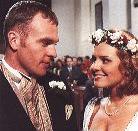Throughout all of history, examples of a domineering male are significantly prevalent and easily identifiable. In Arthur MillerÃÂs Death of a Salesman and Robertson DaviesÃÂ Fifth Business, plots, subplots and the relationships between characters, both major and minor, work to establish the motif of male supremacy and patriarchy. In Fifth Business, Dunstable Ramsay and his childhood friend, Percy Boyd Staunton, each approached relationships differently. However, each approach was aimed at the maintenance of independence and control over oneÃÂs own life. Quite similarly, in Death of a Salesman, the men of the Loman family, Happy, Biff and William, treated the women in their lives with little to no respect, objectifying them and treating them as a doormat to be walked over without remorse. Although the depiction of strong women is made in both works, the motif of a male-dominated, patriarchal-structured society is formidably exhibited throughout.
Although modern women are slowly attaining equal status with men in the workforce, and throughout society generally, the women in Fifth Business and Death of a Salesman are nearly always portrayed as weak and incapable beings.
Robertson DaviesÃÂ portrayal of Mrs. Dempster as a timid and flighty woman foreshadows her future behavior and eventual mental and physical demise. While walking down the street in the village with her husband, Amasa Dempster, one winter evening, Mrs. Dempster is hit by a stray snowball thrown by DunstableÃÂs friend, Percy. Upon being hit, she ÃÂgave a cry and, clinging to her husband, slipped to the groundÃÂ (Davies 8) and ÃÂburst into nervous tearsÃÂ (9). At this, Amasa demanded to borrow DunstableÃÂs sled in order to drag his wife home. The physical dependence of Mrs. Dempster on Amasa in this incident alone, institutes the motif of male dominance using a weak female presence. She clung to her husband in the hopes that he would hold her up and, once sheÃÂd met the ground, she relies on him to literally drag her down the road, back to their house. In addition to this, nearly everyone in the village describes Mrs. Dempster as ÃÂquiet and friendly and sweet-naturedÃÂ (22) but also as being ÃÂslowÃÂ (24) and ÃÂsimpleÃÂ (25). This description only furthered Mrs. DempsterÃÂs image as weak and inferior. In the same fashion, Arthur MillerÃÂs depiction of William LomanÃÂs wife, Linda, in Death of a Salesman degrades her character to that of a doormat for him to wipe his feet on. WilliamÃÂs abrupt manner of dealing with Linda verges on intolerably rude and yet, Linda does nothing to defend herself. In an attempt please William, Linda purchased a ÃÂnew kind of American-type cheeseÃÂ (Miller 16). In response, Willy yells at Linda saying ÃÂI donÃÂt want a change! I want Swiss cheese. Why am I always being contradicted?ÃÂ (17). William then goes on to tell Linda to open more windows and go about other such business to which she responds, with infinite patience, that ÃÂ[the windows] are all open, dearÃÂ (17). Even though Willy has taken to her with a rude and spiteful attitude, Linda continues to baby him and treat him as though he were a king. She fails to stand up for herself to him and, in this way, lends herself fully a position in which she will be taken advantage of. Though both women prove their intelligence in their own rights, the men around them fail to see and appreciate it.
Just as is common in society today, each piece of work sexually objectifies and exploits women. Through situations of alleged rape, affair and womanizing, generally, the men of Fifth Business socially paralyze the women around them. Percy Boyd Staunton is the epitome of a womanizer as he cheats on his wife, Leola, with numerous women from the city and does so with no apparent feelings of guilt. In addition, he brags about his affairs to Dunstable, who was well aware of PercyÃÂs fondness ÃÂof the sexual pleasure a woman could give himÃÂ (Davies 225). PercyÃÂs affairs were never rooted in intellect or emotion, only the physical gratification that could be provided. As well, DaviesÃÂ description surrounding the possible rape of Mrs. Dempster by a tramp, suggests vulnerability in her and an unwillingness to defend herself. Though Mr. Dempster was determined that his wife was taken advantage of, she herself admits that she agreed to intercourse with the tramp because ÃÂ[the tramp] was very civil and he wanted it so badlyÃÂ (45). The relation of civility to the tramp by Mrs. Dempster suggests that she was able to see the incivility of the rest of the men in Deptford. In much the same way as Percy Boyd Staunton, Happy and Biff treat women as merely sexual beings, with very little respect. Early in the play, in one of the first conversations between the boys, Biff and Happy discuss all of the women theyÃÂve been with and Happy relates a story to Biff. Happy tells him that ÃÂthat girl Charlotte I was with tonight is engaged to be married in five weeksÃÂ (Miller 25) and then justifies the statement by blaming the affair of an ÃÂoverdeveloped sense of competitionÃÂ (25). In his actions, Happy, though content with what he has done, makes a liar and a fraud out of Charlotte who, though could have refused to sleep with Happy, did so. Yet again, this suggests a softness in the female character in that she couldnÃÂt resist being with Happy, even though she was engaged to be married. This attitude towards women may have been inherited from William Loman who, too, has an affair with a lady referred to only as ÃÂThe WomanÃÂ (114) throughout the play. Though only present in reveries and delusional episodes, ÃÂThe WomanÃÂ seems to make Willy much happier than Linda does, as stage directions between the two always indicate laughter. Upon discovering the affair, Biff loses respect for his father, saying to him ÃÂYou fake! You phony little fake! You fake!ÃÂ (121). the repetition of ÃÂfakeÃÂ alludes to the theme of the play as a whole. Willy has lived his life trying to convince others that he is more successful than he actually is, and having his own son point it out so blatantly seems to defeat Willy, as well. The example set by William Loman likely influenced the womanizing and degrading behavior of his sons, in the years to come.
The most significant threat to a male-dominated society is, of course, strong women. In Fifth Business and Death of a Salesman, strong women are illustrated using animal imagery, using predominatntly male characteristic or are simply described as ugly. Metaphorically, these images work to degrade women to a position of lower social standing and again, reinforce the viability of a patriarchal society. The strongest symbol of patriarchy in either work is DaviesÃÂ character Liesl. DunstableÃÂs initial description of this woman painted her as a hideous imitation of a woman, who really looked more like a man.
ÃÂ[Liesl] was probably a woman but she wore a manÃÂs dress, had short hair, andcertainly the ugliest creature I had ever seen. Not that she was misshapen; she was tall, straight and obviously very strong, but she had big hands and feet, a huge, jutting jaw, and a heaviness of bone over the eyes that seemed to confine them to small, very deep cavernsÃÂ (Davies 197).
In this passage, Davies presents the strongest woman in the novel with such a demeaning description in order to reflect the views of the society at the time. Women were not synonymous in terms of rights and equalities with men, and thus a strong woman was seem as undesirable and was, subsequently, outcast. Though Arthur Miller is nowhere near as blatant in his description of strong women, through the characters Biff and Happy, he does degrade women using animal imagery. Early in the play, Biff and Happy are talking about all the girls theyÃÂve known and pause to reflect on one in particular. Biff asks Happy if he remembers ÃÂthat big Betsey somethingÃÂ (Miller 20) to which Happy crudely relies that ÃÂthat was my first time- I think. Boy, there was a pig!ÃÂ (21). Though Miller never discusses Betsey in further detail, the reader can assume that her description as ÃÂbigÃÂ was to emphasize her physical dominance over the boys of her age. In the same way that Dunstable described Liesl, Happy depicts Betsey as an animal, more specifically, a swine. This imagery is effective in that it highlights how intimidated men are by the presence of a strong and powerful woman, be it mentally or physically.
Though the presence of a few very strong women is found in each work, the plots, subplots and relationships of the characters work in conjunction to establish and strengthen the motif of male supremacy. Through objectification, affairs and situations of sexual exploitation a strong pattern of male dominance is present in both Fifth Business and Death of a Salesman. The mistreatment of women and the description of their character as weak or incapable further this motif and lend itself to the societal consequences of social inequalities.
Works CitedDavies, Robertson. Fifth Business. London: Penguin Books, 1977Miller, Arthur. Death of a Salesman. Penguin Plays. New York: Penguin Group, 1949





